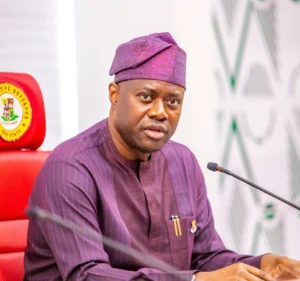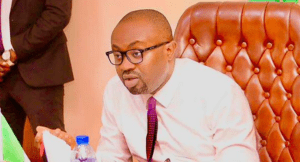Mele Kolo Kyari: A Daniel has come to judgement
By Erasmus Ikhide
Crude oil was discovered in commercial quantity in Oloibiri, in the present day Bayelsa State in 1956; four years before the British granted us political independence. A school of thought believes that if the discovery had been made earlier, the Caucasians would never have fully departed the country and we would have had White Nigerians in a similar manner like what obtains in South Africa.
The black gold, as it is fondly called, has been tragically more of a curse as it has elevated a culture of sloth and lack of innovation which has done nothing but greatly impoverish us. Who could have believed that the revolutionary strides undertaken by the late sage Chief Obafemi Awolowo while he held sway as Premier of Western Region between 1952 and 1959 was from the proceeds of cocoa and other agricultural produce?
The Nigerian National Petroleum Corporation (NNPC) was established on April 1, 1977 by the military government of the then General Olusegun Obasanjo, then it has been involved in an endless cobweb of corruption and cesspit of ineptitude.
Mele Kolo Kyari was appointed as the 19th Managing Director of the Corporation on July 8, 2019. Many critics of the Buhari led government criticized him to the High Heavens as another northern appointment, opted to throw away the baby with the bath water.
Days after his appointment, he unveiled Transparency, Accountability and Performance Excellence (TAPE), a five-step strategic roadmap for NNPC’s attainment of efficiency and global excellence.
According to a report done by Premium Times. He said the five steps for realizing the objectives of TAPE were to ensure:
1.NNPC opened up its systems to public scrutiny;
- Its operational processes were made transparent and accountable to the Nigerian people and the government;
3.The new system would operate along with well-defined operational processes, benchmarked against established global best practices by world-class oil and gas companies;
- Set the right operational cost structure, to guarantee value-addition towards NNPC’s sustained profitability, and
- Set achievable goals, priorities and performance standards and criteria, by developing suitable governance structures for its strategic business units, and the entrenchment of team-spirit, work ethic and collaboration with all key stakeholders to achieve set corporate goals.
So far, the objectives of TAPE have been met.
He initiated bold minded reforms in the upstream sector. His creativity saw an alternate financing deal for the Nigerian Petroleum Development Company (NPDC). Within the last one year, Kyari ensured the execution of a funding and technical services agreement (FTSA) as well as a alternative financing deal for NPDC’s OML 13 valued at about $3.15 billion and OML 65 for $876 million. These agreements resulted is a 32% and 21% incremental production output in OMLs 40 and 30.
Also, 14 companies participated in the auction for the financing and redevelopment of OML 119 operated by the NPDC. The twin offshore block made up of Okono and Okpoho fields located approximately 50 kilometres offshore south-eastern Niger Delta operated by ExxonMobil.
Kyari described OML 119 as one of NNPC’s critical projects, which aligns with the Federal Government’s aspiration to boost the country’s crude oil and gas production, growing reserves, and monetizing the nation’s enormous gas resources.
He has also revised the unit costs for joint ventures (JV) and production sharing contracts (PSC).
He has also been able to save costs for the government through NNPC’s revision of joint venture and production sharing contract (PSC) operators’ unit costs, down to $19 per barrel and $18.3 per barrel, from the initial $31 per barrel and $24.3 per barrel respectively.
Concerned about the impact of high oil production cost on the government revenue, Kyari has, in the last one year, demonstrated commitment to achieving the industry target of reducing oil production cost to an average of $10 per barrel by 2021.
Under Kyari’s management in the last one year, the NPDC also acquired four new oil acreages (OMLs 11, 24, 116 and 98, while recovering debts for gas supplies totaling about N16.64 billion and $3.55 million.
There has also been sustainable average oil output under his pragmatic leadership. Despite the challenges in the oil and gas industry, Kyari was able to ensure the NNPC subsidiary in charge of the government investment interests in the oil industry joint venture projects, the National Petroleum Investment Management Services (NAPIMS), was able to achieve an average oil production capacity of 1.8 million barrels per day prior to the recent decision by the Organization of Petroleum
Exporting Countries (OPEC) to cut its members’ output to boost crude oil prices and stabilize the oil market.
Kyari has also supported NAPIMS to secure external funding for the SPDC’s Santolina 3 projects expected to deliver an average production of 16,300 barrels of oil per day, while also superintending over the resolution of the Escravos gas-to-liquids (EGTL) cost dispute with Chevron Nigeria Limited (CNL).
Nigeria LNG Train 7 FID For almost two years, the final investment decision (FID) for the construction of Train 7 of the Nigeria LNG project was delayed.
The NNPC and other partners in the project could not come together to commit to the development of the project.
The outbreak of the coronavirus last year worsened the problem as the global economy came to a virtual standstill. But, Kyari did not allow all the crises to rob Nigeria of all the benefits derivable from the execution of the project.
At the height of the global pandemic, Kyari ensured the NNPC and its JV partners, including Shell, Total, and ENI, came together to execute the NLNG T7 FID on December 27, 2019. He went ahead to mobilize for the signing of the engineering, procurement and construction (EPC) contract for the project awarded to the Saipem, Chiyoda and Daewoo (SCD) JV Consortium.
The signing of the contract signaled the commencement of EPC activities for NLNG T7 Project. On completion, the production capacity of the six-train plant would expand exponentially by 35 per cent, from the extant 22 million tonnes per annum (MTPA) to 30 MTPA, and boost Nigeria’s competitiveness in the global LNG market.
The project has the prospects of further attracting foreign direct investment (FDI) in excess of $10 billion to Nigeria.
The AKK Pipeline Project Just as Nigerians were jubilating at the milestone on the Nigeria LNG
project, Kyari ensured President Muhammadu Buhari launched the EPC activities on the 614 kilometers-long Ajaokuta–Kaduna–Kano (AKK) pipeline project by NNPC last week.
Considered to be at the heart of the country’s economic growth, Kyari has pursued the execution of the project with single-minded commitment to see that it is completed on schedule in 2023.
The pipeline project represents phase one of the 1,300 kilometre-long Trans-Nigerian Gas Pipeline (TNGP) project being developed as part of Nigeria’s Gas Master Plan to utilize the country’s surplus gas
resources for power generation as well as for consumption by domestic customers.
The TNGP project also forms part of the proposed 4,401 kilometre-long Trans-Saharan Gas Pipeline (TSGP) to export natural gas to customers in Europe.
Uninterrupted Fuel Supply Prior to his appointment, hiccups in the supply of petroleum products
were a common feature in the Nigerian economy. The incessant disruptions in fuel supply affected Nigerians’ ability to plan effectively. They could not predict when the next fuel scarcity would
hit the country and send families to spend days and nights in long fuel queues at filling stations.
Kyari leveraged on the existing Direct-Sales-Direct-Purchase (DSDP) product supply arrangement he started and sustained while in office as the GGM COMD of the NNPC, to guarantee energy security for Nigerians.
2020 crude oil lifting contracts In August 2019, a few weeks after his inauguration, Kyari announced
the issuance of fresh crude oil lifting contracts to 15 local and international oil marketing and trading consortia/companies under the 2020 DSDP scheme.
With the country’s four refineries still operating far below their installed capacities, and unable to produce enough to meet the country’s daily national consumption need for petroleum products, the
15 contractors were to utilize the 445,000 barrels per day crude oil allocation for local refining to bring into the country petroleum products for domestic consumers.
But, Kyari said the difference in the latest issuance of the oil lifting contracts was that this would be the first time since the DSDP programme began in 2016 that the NNPC would officially be making public the list of all the contract winners.
Kyari said revealing the names of the beneficiaries to the public was a new normal for NNPC as part of the policy direction, pledge and commitment of his management to transparency and accountability in
NNPC’s operations going forward.
To sustain the era of uninterrupted supply of petroleum products, Kyari assured that his management would continue to revamp downstream infrastructure to guarantee availability of 90 per cent pipeline for fuel distribution; ensure automation of the fuel distribution system, and grow NNPC Retail’s market share to 30 per cent.
“Operation White”
To build on the success of the DSDP programme, entrench energy security and deepen transparency in petroleum products supply and distribution, Kyari, in collaboration with the Minister of State for
Petroleum Resources, Timipre Sylva, initiated an innovative programme, “Operation White”, to curb products diversion and smuggling, and ensure that the entire country was kept continuously wet with
petroleum products.
Under the initiative, a team of 89 officials drawn from various government agencies involved in the petroleum products supply process was inaugurated, tasked with the responsibility of monitoring and tracking fuel distribution and consumption throughout the country.
The team included representatives from the NNPC, Department of Petroleum Resources (DPR), Petroleum Products Pricing Regulatory Agency (PPPRA), Petroleum Equalization Fund (PEF) as well as the Department of State Security (DSS).
Under the initiative, Kyari ensured actual volumes of petroleum products imported and consumed in the country were authenticated. The NNPC now has a customer express solution and online marketers’ portal, which is live for oil majors and Depot and Petroleum Products Marketers Association of Nigeria (DAPPMAN) to monitor loading and lifting of petroleum products from NNPC depots. Plans are on course for the system to go live for members of the Independent Petroleum Products Marketers Association of Nigeria (IPMAN) by the end of the second quarter of 2020.
These achievements are by no means all that can be credited to the Lee Kuan Yee like visionary leadership of Kyari and we in the media have the duty to praise our public officials when they do well so that we don’t become permanent Rottweilers.
A Daniel has indeed come to judgement!
Erasmus Ikhide is a media strategist and can be reached via:
ikhideerasmus@gmail.com; 08035032123




